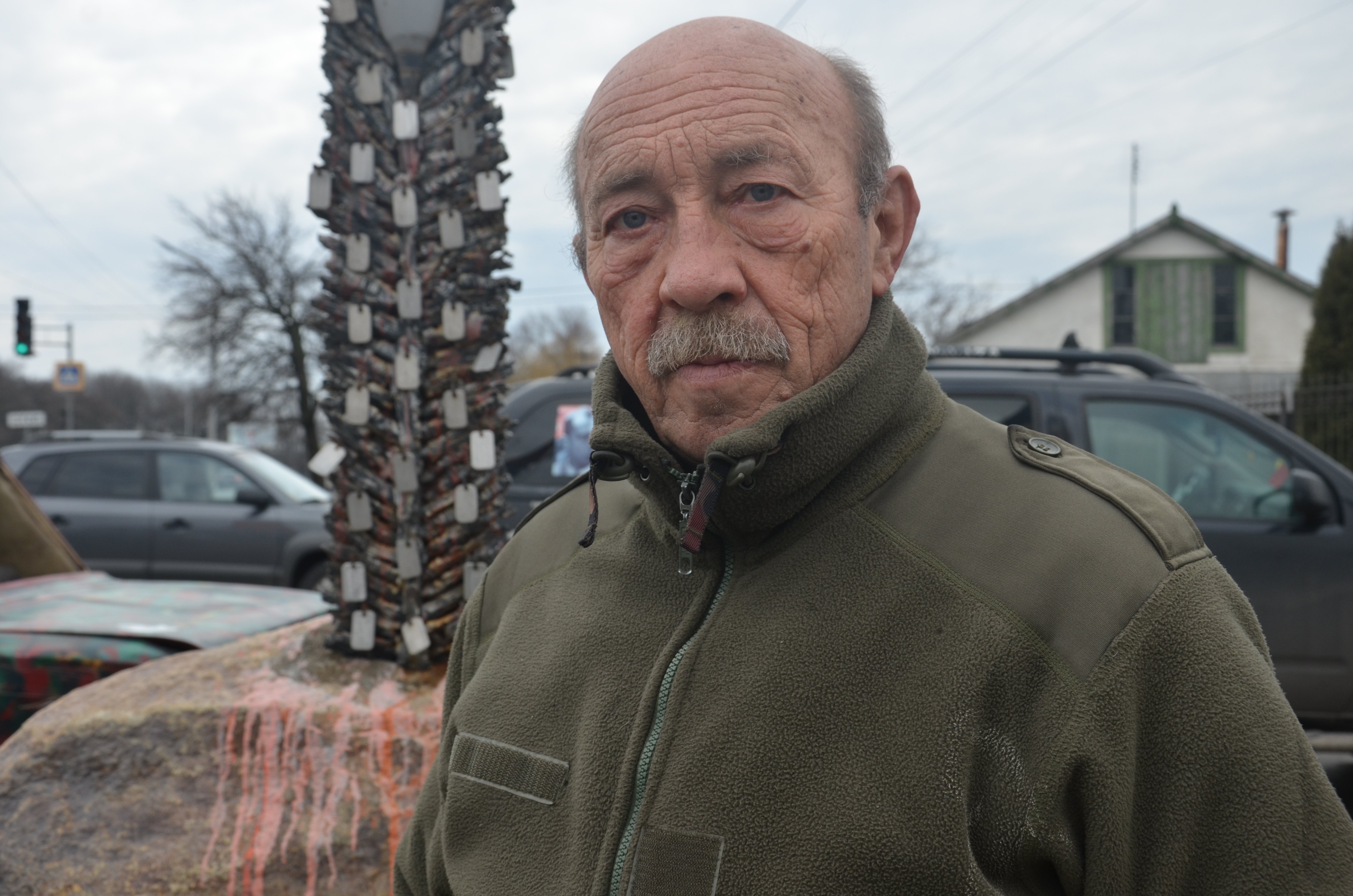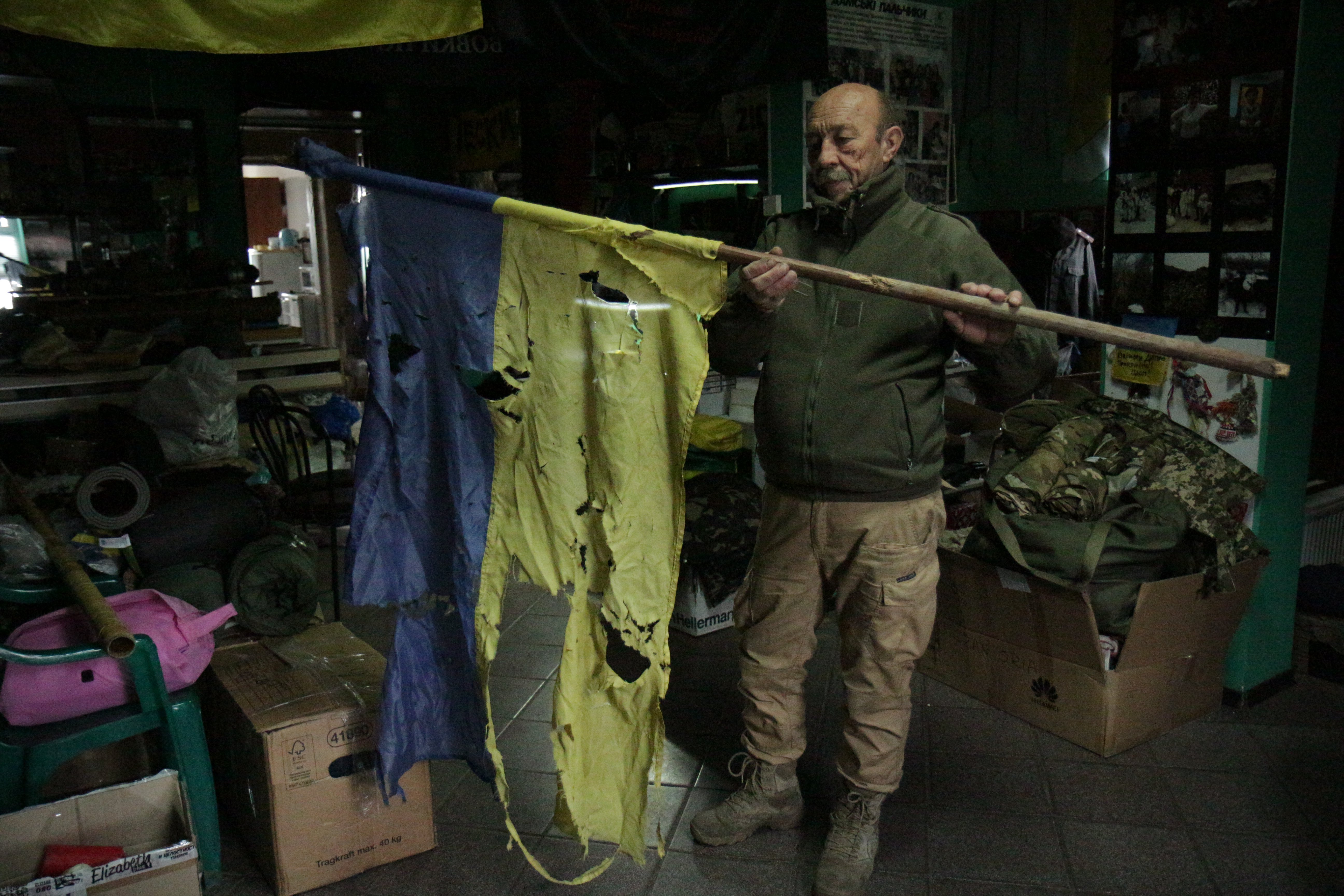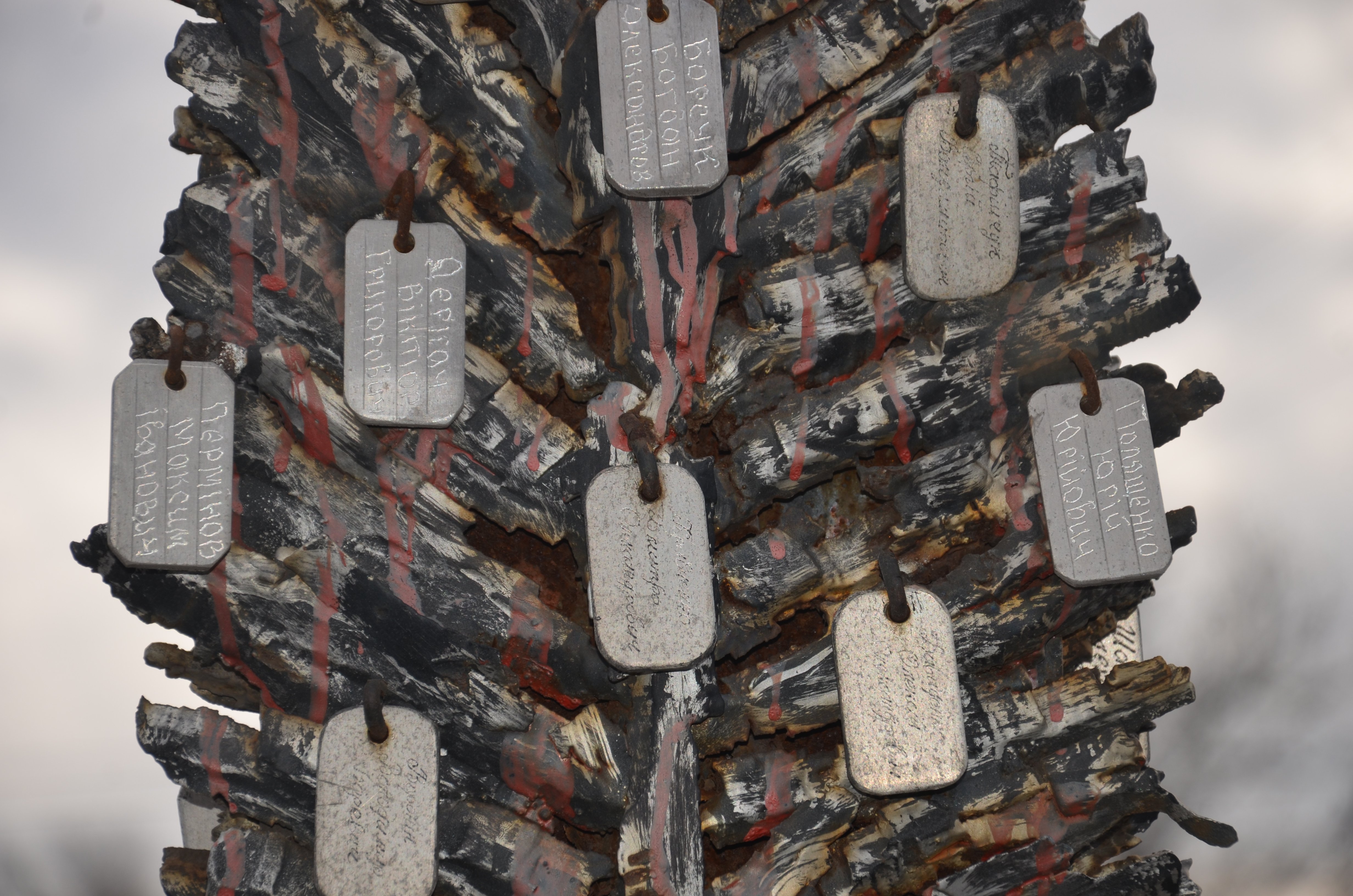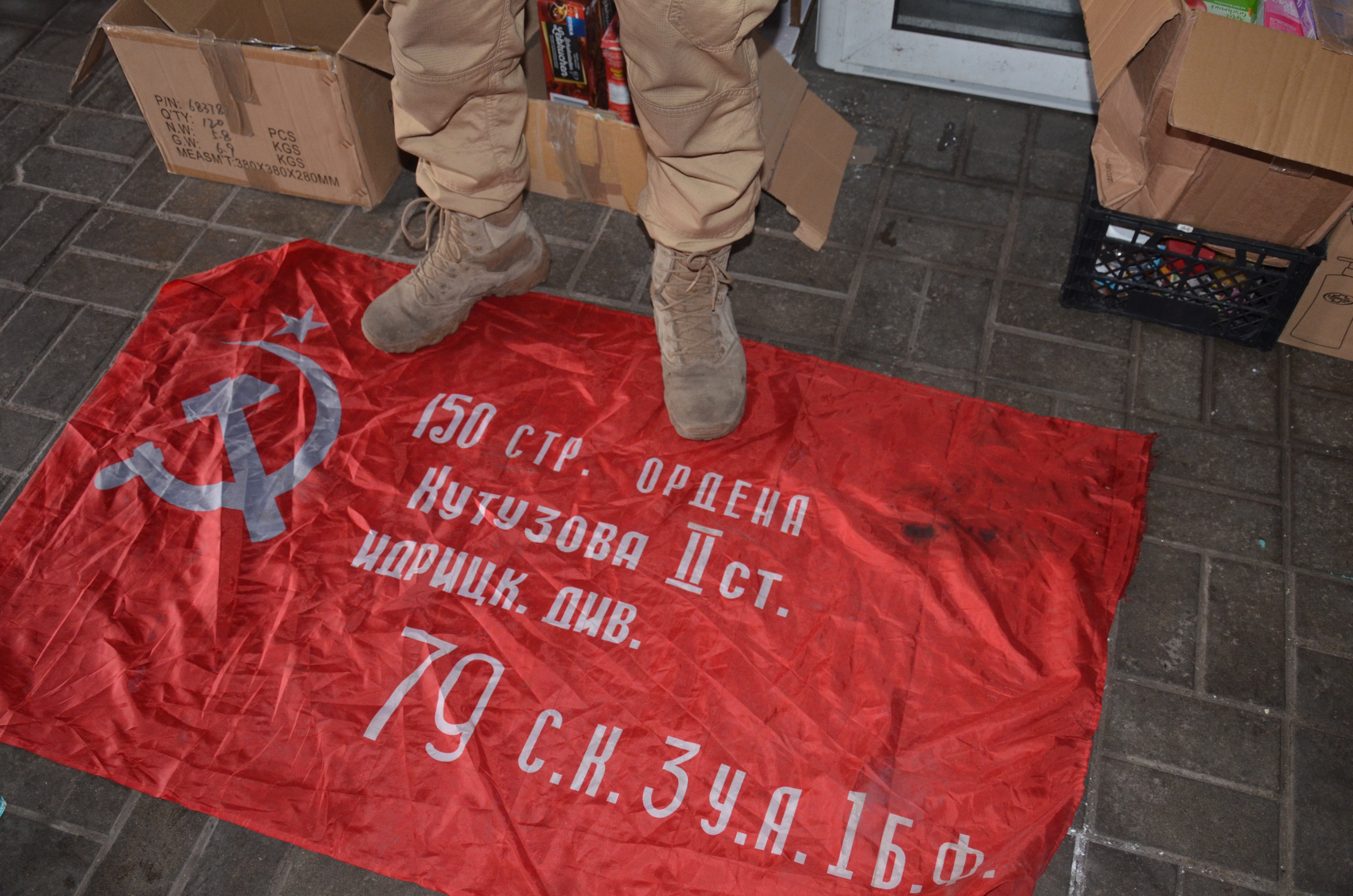Criminal investigation, capture, escape and sabotage behind enemy lines. Now Grandpa works in a museum
"No one knew for three months where I was. The children were told that I was no longer alive, they even showed them my grave. But I returned – and the work began."
Translated by Dmitry Lytov & Mike Lytov
Anatoly Tokarev was born in Pavlograd. He was on a list of minor offenders as a boy, served in Afghanistan, and then returned to his home town to work as a criminal investigator. Then he was captured, escaped from captivity and brought valuable information, including lists of Ukrainian prisoners of war. He turned several separatists to the Ukrainian side and established cooperation with locals on the other side of the front line. After the escape, he did sabotage and reconnaissance behind the enemy lines.
Apart from his military activities, he volunteers, curates a museum and teaches youths.
He is better known as Grandpa (“Did” in Ukrainian) among his fellow combatants at the frontline, or as Dmytrovych (his patronymic, which means “son of Dmytro”).
Talking to Grandpa is very difficult. Dmytrovych speaks in short phrases which sound like pieces of multiple puzzles. If you know the context of the events that he often refers to, then you can put the pieces in the right places.
Grandpa seems to smile under his mustache but keeps his eyes on the interlocutor's reactions. He is watching me like this, even though I came with a recommendation from his friends!
At the front, everyone knows everyone
In 2014, Grandpa managed to escape from captivity from the notorious “Izbushka” (the Little Hut, the Ukrainian Security Service’s headquarters in Donetsk captured by the Russia-backed separatists earlier that year). Then he and his fellow combatant Yuri went to Debaltseve and brought aid to the guys from the 25th brigade who were encircled by the enemy. They had not eaten for a week and drank water from radiators. Grandpa and his partner made their way through the fields to the soldiers and handed over what they needed, but on the way back they were captured themselves.
“We were transported to Khartsyzk, then to the infamous Little Hut in Donetsk. Our POWs (the soldiers captured during the combat near Illovaisk – the author) sat in the cell next to former separatist combatants,” Grandpa says.
“It happened that there were 40-45 of us sitting in a single cell designed for 10 people. I was the eldest of the ‘khata’ (a ‘village house’ in Ukrainian, which means a cell in criminal jargon – the author). Everyone thought I was a local criminal. They found out who I actually was only a day before I escaped.”
— “And who are you?”
My question was in vain – Grandpa just smiled back at me. I will have to put the puzzle together myself: Anatoliy Tokarev was born in Pavlograd, in Prytochylivka, which was considered the most criminal neighborhood. He was on a list of minor offenders as a boy, served in Afghanistan, and then returned to his home town to work as a criminal investigator with the local police. Then there was the capture.
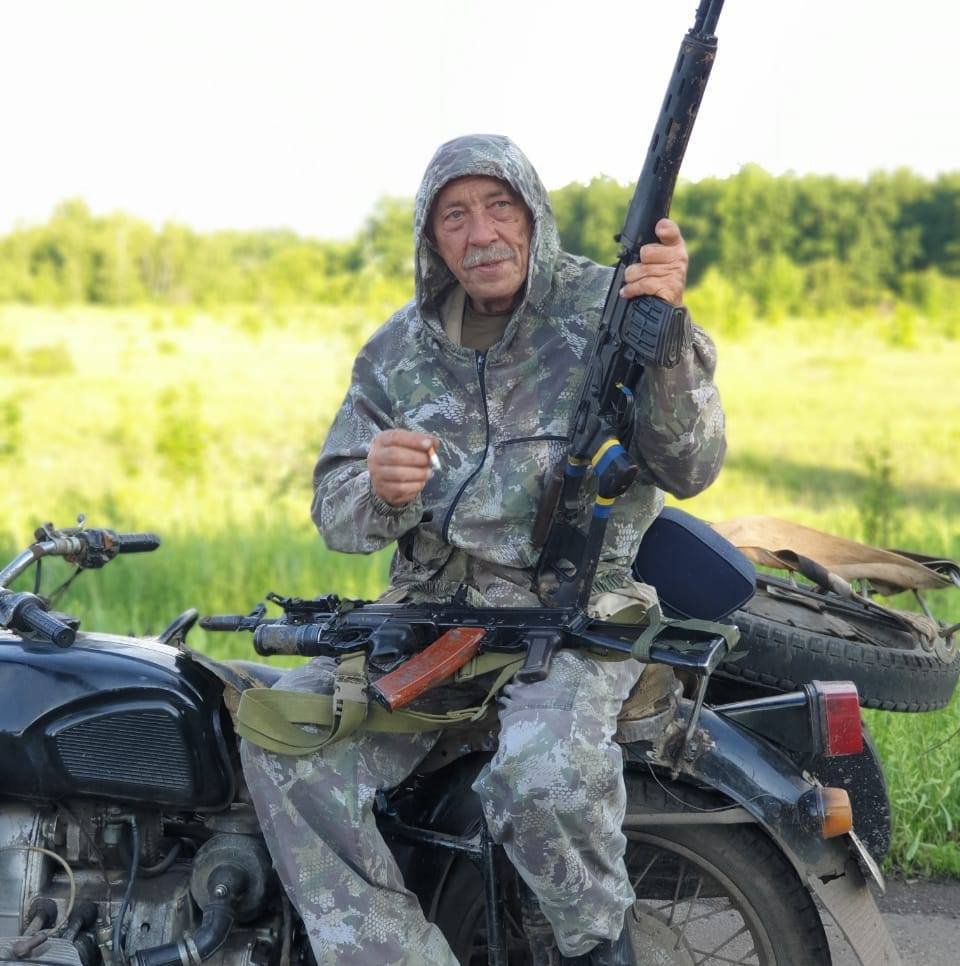
Some of his cellmates in Donetsk were separatist combatants who were arrested on suspicion of cooperation with Ukraine. Once, the personal bodyguard of Zakharchenko, the leader of the “Donetsk People’s Republic” was thrown into the cell by mistake.
“The guards of the ‘khata’ confused something. The guy ended up in our cell and did not live until the morning, suddenly croaked. Things happen!” Grandpa grins.
Zakharchenko (the leader of the “Donetsk People’s Republic”, later killed by a bomb blast) personally interrogated Grandpa as the elder of the “house”. Grandpa was taken out several times for demonstration shooting – he was placed against the wall and shot. The guards broke his leg in two places with the butt of a rifle, broke his ribs, and cut off his partner’s ear.
“While working as a police detective, I understood the ‘laws’ of criminals very well. Most of the Donetsk people at the ‘khata’ were criminals. I was able to understand them. There were patriots, but they were quickly revealed. There were ‘decoys’, and those were also immediately visible.
While I was sitting, they tried to persuade me to cooperate. They offered it to me, with my experience in criminal investigation! It turned out that I myself recruited several separatists and prison guards. And the locals were willing to cooperate.
We escaped from captivity together, my partner and I. Before that, only one paratrooper from the 95th brigade managed to escape from the Little Hut.
No one knew where I was until I returned home. They told my children that I was not alive, and even showed them my grave.”
“But how did you manage to escape?”
“I was in crutches: one leg was shot through; the other broken. I fell behind, sat down to rest... A car was waiting for us. We stayed a while in an apartment in Donetsk and quietly left. They kept looking for me in Donetsk for three months, while I was already as free as a bird.”
He spent a good amount of time in captivity: he obtained a lot of valuable information and brought out lists of 576 Ukrainian prisoners of war. Then, based on those lists, exchanges were carried out (special contact groups worked during prisoner exchanges in 2014-2019. Ukraine was represented in the Donbass contact group by Iryna Gerashchenko, then the vice speaker of the Rada, the president’s authorized envoy for the peaceful resolution of the conflict in Donetsk and Luhansk regions - the author).
At one of the exchanges, Grandpa managed to go behind the backs of the occupiers and kidnap two of our fighters, who were assigned to the exchange. Then they acted out a skit.
“A person from our contact group had a good reaction. He understood everything on the fly. They only whispered ‘minus two’, he understood and played along. And then he says: ‘Grandpa, don't take such risks anymore.’ But that time we managed to get eight of our people out of captivity instead of four. Plus the two kidnapped ones.
If I go to visit all those whom we got out of captivity and stay at least three days with each one, I will return home in five years,” Grandpa rejoices.
Grandpa thinks about his capture as a valuable experience. He tells how the prisoners behave differently, especially the people from Donbass.
“One such guy from Donbass participated in shooting another POW. Later, he was exchanged as a hero. But you can't hide an elephant in a room. After capture, everyone must be thoroughly checked. I was also checked for a whole year. I'm not offended.”
Their sabotage groups raid our positions, as we do theirs
“Donbass is a peculiar region. There are criminals, there are stubborn people, some are disgruntled or simply short-sighted, ready to work for Russia. In 2014, the Muscovites were not as harmful as local traitors.
Many officers of our special services began their career back in the Soviet times. In class, we sat next to those who have now become enemies.
Some of our combatants were exposed for surrendering their positions. How many FSB officers were and are in the ranks of our intelligence and police! Russians left many moles in our ranks. Some of them reveal themselves quickly, but there are ‘canned moles’ that sit quietly for a long time and act at the right moment.
There was a case when we went through Nebo to Spartak (Nebo is the control tower at the Donetsk airport, Spartak is a village near the airport, from where the enemy attacked DAP - the author). No one knew our direction, except for one soldier from the unit. They were waiting for us with an ambush. We made two more deliberate checks by leaking bogus data to this soldier. In the end, the traitor disappeared. Apparently, he ran away...” Grandpa hides his emotions in his mustache.
“But there are also our people in Donbas, there is a reason to liberate these territories.
Once I got a call from some good people: the Russians are going to encroach on Pisky, a hundred people. I call the intelligence, but there is no connection. I had to wake up the father of a soldier I knew, he called his son and told him: there is danger, you need to act quickly. The son reported to the commander: ‘Some Grandpa told us...’. They didn't really believe it, but they went to the indicated place. At first glance, it was quiet, not a soul. And they looked closely — there was a crowd of enemies! The breakthrough failed. In the morning, the enemy left 70 dead.
Their sabotage groups encroach on our positions, as we do on theirs. Once, we stole a KamAZ truck full of ammunition from the enemy. The separatists spent a week looking for it in vain. And then they entered our positions quietly, and pissed into the borscht – such things happened, too.”
“In our groups, 80% are locals from Donetsk and Luhansk. Some crazy people, in a good sense, live in Pavlograd as well.
Once, one jerk wanted to bomb a graduation party at school. Our people from the same city convinced him that the school was not worth it, it would be better to blow up the bridge ‘through which an important convoy will pass.’ The special services arrested the saboteur at the moment of planting explosives.
Here is another story: there was a girl nicknamed Postcard Svetka in the occupied territories. She got this nickname because she was as beautiful as a picture. Svetka enticed enemy soldiers, invited them on dates and slipped them some pills – just what they deserved. And our boys were waiting nearby.”
“What is it like to walk behind enemy lines?”
“In order to enter, you need to work out ten options for entry and twenty exits. Never go out the way you came in. No one smokes for at least a week before going out. You have to see who is ahead of you. Don't trust anyone. Have a good psychological preparation. In a critical situation, you either play dumb, or immediately solve the problem (kill the enemy - ed.). We smeared each other with shit and snot when we had to pretend to be homeless.
A well-planned raid behind the enemy line is possible once a month. All risks must be anticipated. We need to have good cover, good backstories, and profound knowledge of the situation. There are many nuances. The great spy Arestovych makes me laugh (Olexii Arestovych boasted that he had 33 combat missions over the front line in 2018 - the author).
Currently, sabotage groups like to dress up in the enemy uniform. There are subtle differences in uniforms, types of troops and patches, everything must be taken into account. And the main thing is not to mumble something in Ukrainian.
Those who fight against us are not fools. The same Wagnerites are mostly ex-convicts, they have no fear, they have a machine gun and at least 120 cartridges. And their bullets will fly in your direction.”
“Do you need any special skills?”
“You need to be able to use all types of weapons. Definitely a knife. And even a crossbow. Occupiers were often found with an arrow in their eye in Donetsk in 2015-2016.
There was also a group that worked hard and left the dead with their eyes gouged out. It was brutal. A useful rumor spread that Muslims were involved. It is still better not to know the truth.”
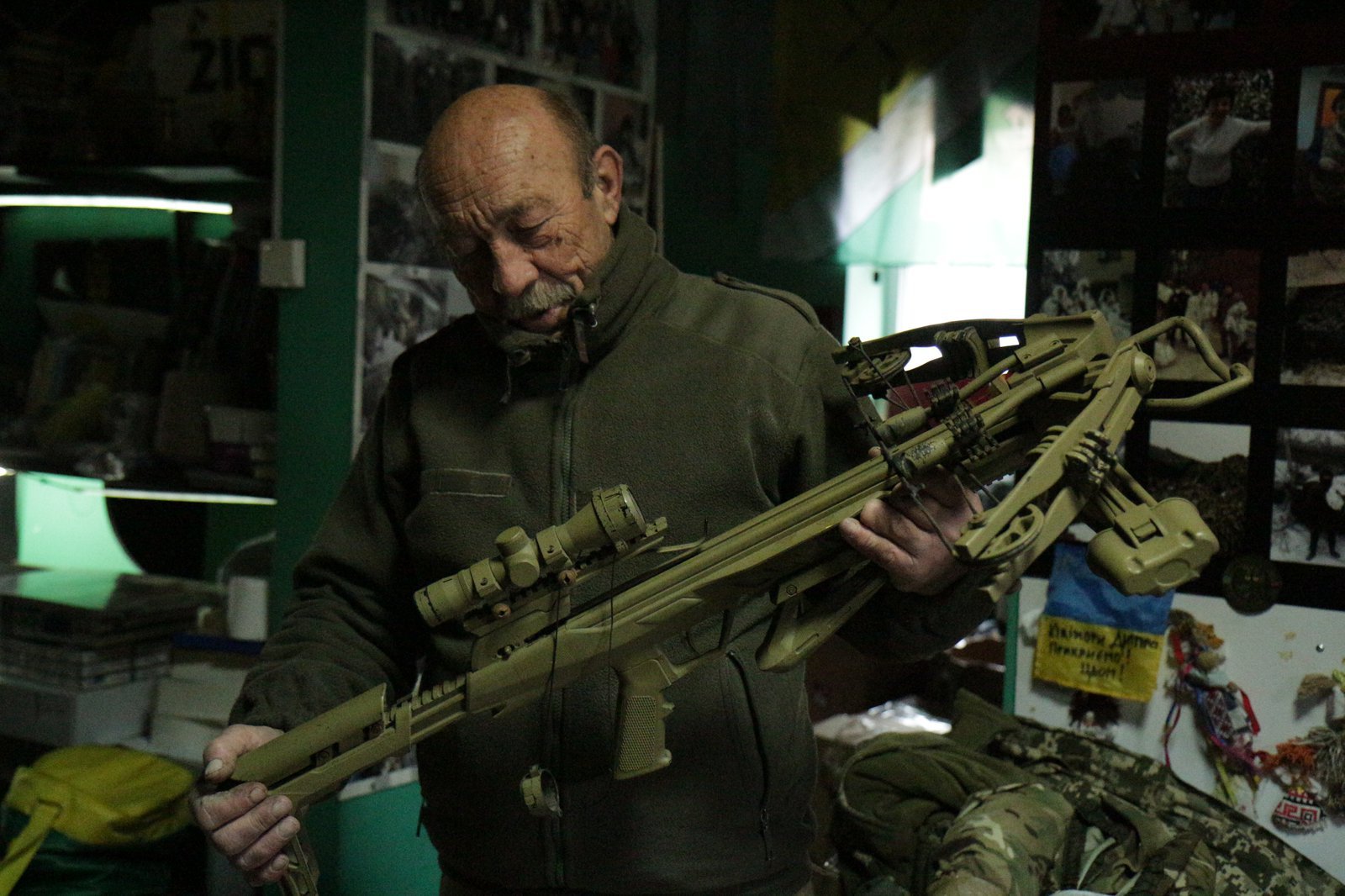
A 75-year-old man and an old woman with a goat
Grandpa is 65 years old, and his whole family is fighting. His wife reliably covers his rear, their eldest daughter has served in the army for five years, as well as their son-in-law, and the younger son-in-law is now in Bakhmut. Grandpa, as his nickname suggests, has grandchildren - nine of them!
Grandpa takes humanitarian aid to the front lines and looks after the museum of the Russian-Ukrainian war, where exhibits are now stored next to aid packages for the front.
Grandpa assures us that he no longer goes to raid the occupied territories – there are younger people to do the job. “We are volunteers: hedgehogs and plumbers,” Dmytrovych jokes. Enough for a wise man.
“Such interesting boys used to come to Grandpa,” says 19-year-old Danylo from Sloviansk, who volunteers at the museum, “I thought they were programmers. There is no way I could’ve guessed what they are doing. And they thank Grandpa for teaching them how to ‘clean the premises’.”
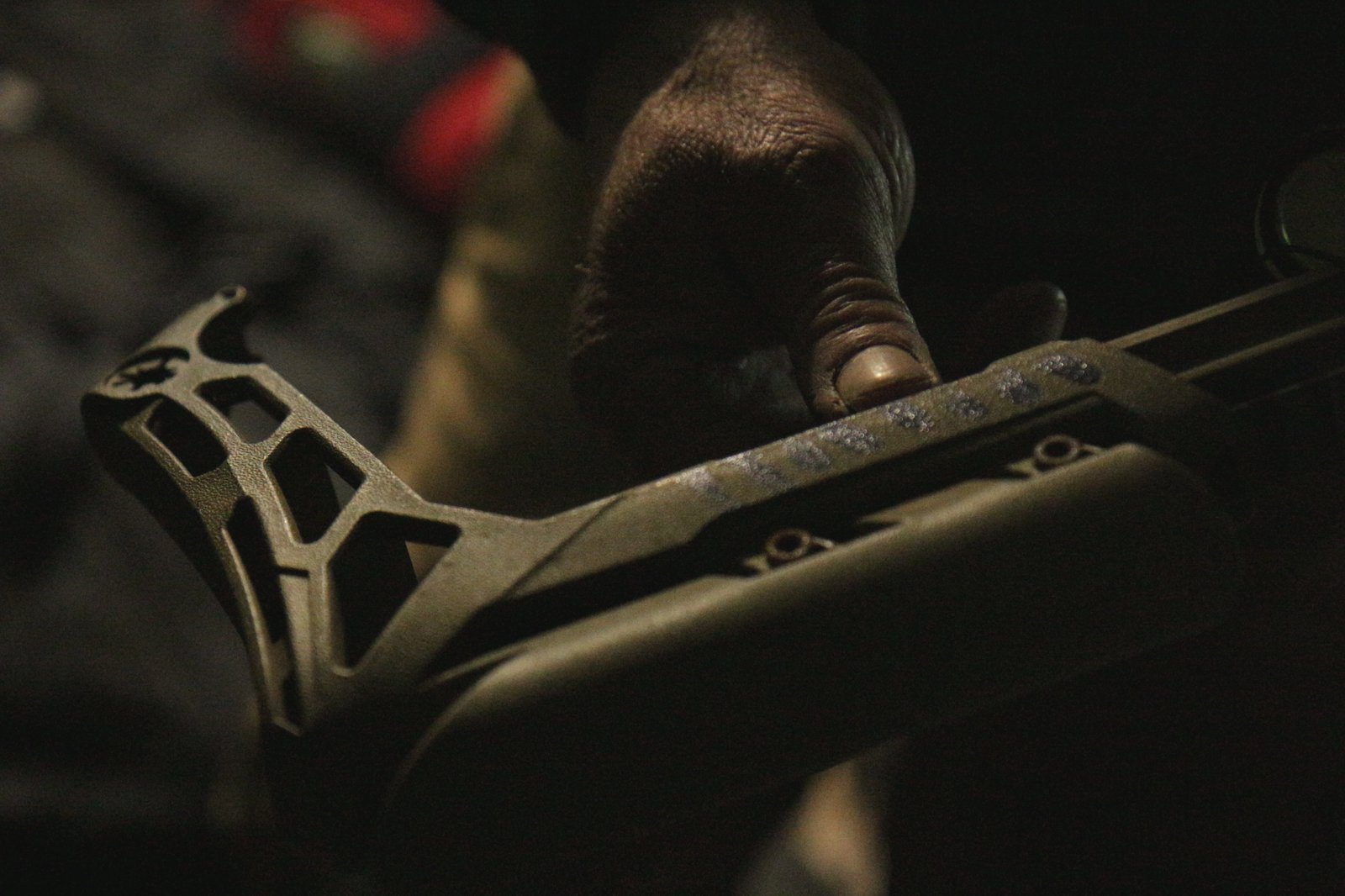
“The war is going very fast. You won't have time to read military literature, it's better to listen to people with extensive combat experience. Our Grandpa is worth his weight in gold,” Danylo philosophizes.
“And how did you deal with criminals after the capture?” I ask.
“Criminals in 2014-2016 kept a distance, stayed away from the war. Of course, some of the convicts fought, but they were not accepted into the Armed Forces, only into the Dobrobats (the volunteer battalions). And it's no secret that ‘lawful thieves’(criminal bosses - the author) were mostly pro-Russian.
But after February 2022, everything changed. The crime lords felt that the war also affects them, because their cities are being destroyed, their relatives, friends, and acquaintances are dying. They had a gathering, it was no secret, and discussed the topic of war. And they support Ukraine. Cooperation is ongoing.”
Yesterday one put the other one in jail, and now they are fighting side by side
In this phase of the war, the country was not divided into criminal and law-abiding, but into the pro-Ukrainian and the anti-Ukrainian.
There are still plenty of traitors among the police and the security. Convicts are fighting for Ukraine. Ex-convicts and the police jointly defend Pisky and Bakhmut in tough battles. Yesterday one put the other one in jail, and now they are fighting side by side.
“And those local people who volunteered to cooperate, did they come in handy?”
“Of course. The method of spreading the necessary information through grandmothers worked well.
The main thing is not age, but how the mind works. There was an elderly woman in Sloviansk who grazed a goat and gave coordinates to our artillery. In WW2, it turns out, she served in the artillery. She messaged us: ‘Sons, you hit the wrong spot, take two degrees to the left.’ The ‘sons’ did not listen to her at first – what could an old woman with a goat know? But they corrected it, hit it, and so cooperation began.”
The boys did not listen to her at first – what could an old woman with a goat know? But they corrected it, hit it, and so cooperation began.”
“There was a 75-year-old man who was walking 30-35 km a day. He kept in his head all the positions and the number of enemy soldiers and equipment he was seeing and then passing them on to us very accurately.
And – do you remember how it exploded in Tokmak, Melitopol, in occupied Kherson, Chornobayivka? Bang – and it burns! And no culprit can be found. Because how could we know the coordinates?
Russian and Ukrainian intelligence work using the same methods.”
“Do you have a personal fear?”
“I have two. To die before victory. And not to be able to return my debts to the volunteers (laughs).”
Our victory is in the children
“You were born in Pavlograd, the center of Western Donbas. You could have fought on either side. Why did you choose this one?”
“My grandmother was not afraid to tell me how she lived through the Great Famine (1932-1933), how she cooked nettles and goosefoot grass. How communists shot people for hiding a few ears of corn. And many do not know this, because the elderly were afraid to speak, they were afraid that they would be imprisoned.
Pavlograd is an interesting city. Its name is the result of Russification, because historically it was Matviivska Sloboda (Samara Manor). Distinctly Ukrainian toponyms remained in the names of the rivers: Vovcha, Samara, Hniyuka, Kocherga. A secret Cossack route to Kalmius and Kagalnyk passed through Vovcha. The city is known for the 1930 uprising against the Bolsheviks. It is the only one of two cities in the world that liberated itself during the Second World War. This is an important crossroads between Zaporizhzhia, Dnipro, Donetsk and Kharkiv. There have always been many extraction mines and strategic facilities here.”
“My grandmother was not afraid to tell me how she lived through the Great Famine (1932-1933), how she cooked nettles and goosefoot grass. How communists shot people for hiding a few ears of corn. And many do not know this, because the elderly were afraid to speak
“Russians even came to us all the way from Tyumen (in Central Siberia) to earn money. They built houses here. In 1965, we had sausage in local stores, while they ate boiled radishes. And they called their friends: ‘Come here, they have toilets in their apartments!’
Due to these newcomers, or for other reasons, the demographic statistics of Pavlograd shows a large percentage of people who consider themselves Russian.
But the real locals are pro-Ukrainian.”
“Three years ago, you created a unique museum of the Russian-Ukrainian war. How did it start?”
“The first exhibits in the museum are the trophies of our raids and exercises: shot barrels, mine shafts, documents of Russian army servicemen, their insignia and much more. We got all of this with our own hands (laughs). At first, the exhibits were placed in the yard, then they occupied my wife's cafe ‘Natalie’.
The remarkable monument in front of the entrance was the idea of Sashko the Shooter. (Sashko Gospod, nicknamed Shooter, actually a sapper, has been fighting since 2014, first in the Right Sector, now in the 56th brigade - the author). 300 kg of Russian shells were used to build the monument. It was supposed to resemble the magical sword Excalibur, but people began to call it a cross. Sure, let’s call it a cross. The important thing is that it exists, and displays the tokens of the dead guys. Debris for the monument was collected from the entire frontline over two years. Some fragments were picked up in the field while still hot.”
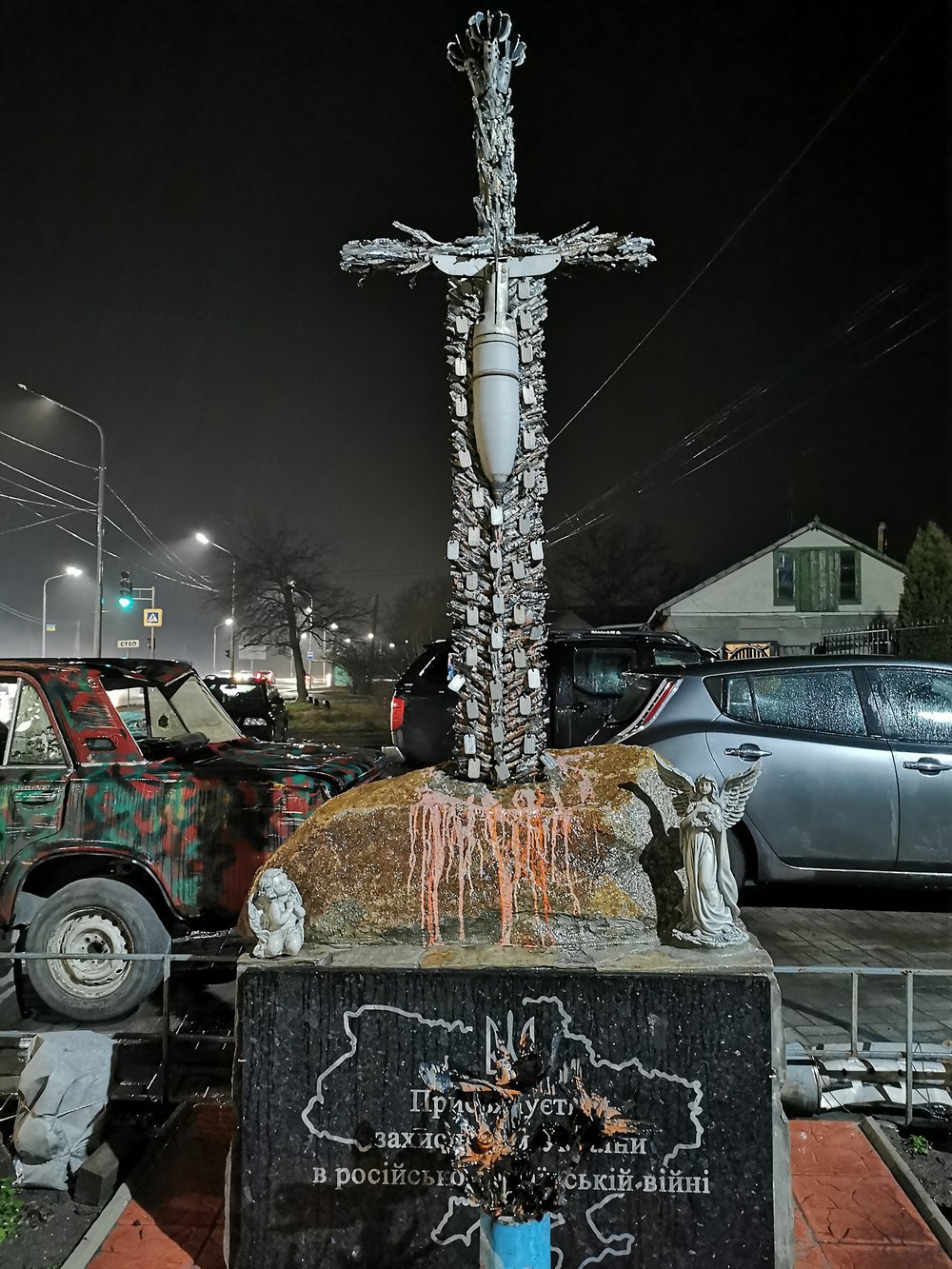
“The most valuable things in the museum are battle flags and personal belongings of soldiers. They are often brought by relatives of the dead. I haven't counted the total number of exhibits for a long time – probably several thousand were collected. At the moment, we receive especially many items.
The museum is designed primarily for children. I’m investing in the kids. I want to tell them the real history of Ukraine and the Russian-Ukrainian war. Just look at what they do with children in the occupation. The war has been going on for nine years. The child was, say, 10 years old at the beginning of the war. Now he is 19, spent nine years of upbringing listening to Russian propaganda. Who will that child grow up to be?
It is very important to fight for the children, because in them is our future and real victory.”
